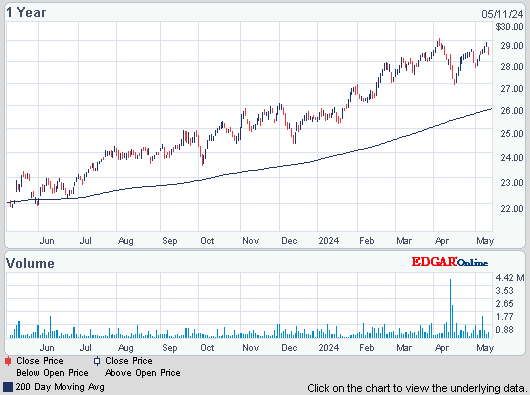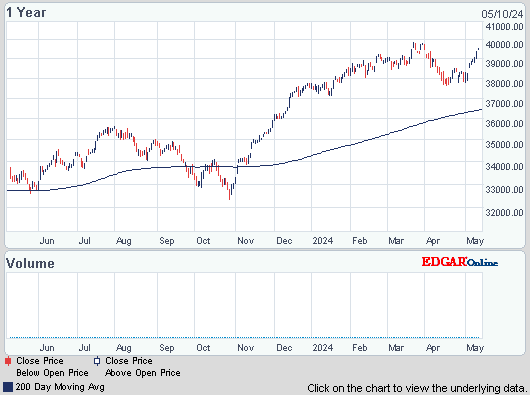In the last 2 hours of trading Dow recovered most of the earlier loss to finish off only 24, decliners over advancers 3-2 & NAZ went up pocket change. The MLP index dropped a big 5 to 446 (unable to stray from 450 for months) & the REIT index added 1 to 264. Junk bond funds were about 1% lower & Treasuries sank, taking the yield on the 10 year Treasury to its highest level in 3 months. Oil continued strong & gold posted the biggest jump in 7
weeks as the dollar pared gains & commodity prices advanced,
led by crude oil, renewing demand for an inflation hedge.
AMJ (Alerian MLP Index tracking fund)

![Live 24 hours gold chart [Kitco Inc.]](http://www.kitco.com/images/live/gold.gif)


Photo: Bloomberg
Services from banking to transportation grew more slowly in Nov, pointing to a US economy that is making progress in fits & starts heading into the new year. The Institute for Supply Management’s (ISM) non-manufacturing index dropped to 53.9 from 55.4 in Oct. A gauge above 50 shows expansion among companies that account for almost 90% of the economy. Other reports showed company hiring picked up more than projected last month & sales of new houses surged in Oct. The Nov decline was paced by a slowdown in hiring & business activity. But the ISM’s new orders gauge for the service industries was little changed, capping its strongest 4 months since mid-2011. “It’s still a fairly strong report,” Anthony Nieves, chairman of the ISM services survey, said. Respondents “feel confident finishing up this fourth quarter. There is still a little bit of uncertainty, but overall, there seems to be strength in the non-manufacturing sector.”
Services Slowdown Highlights Uneven U.S. Expansion: Economy

Photo: Bloomberg
Gains in manufacturing, technology & housing fueled “modest to moderate” economic growth from early Oct thru mid-Nov, according to the Federal Reserve (FED). “Hiring showed a modest increase or was unchanged,” the central bank said in its Beige Book business survey, which contains anecdotal reports from the 12 Fed district banks 2 weeks before the officials meet to set monetary policy. Consumer spending increased in most of the country, with retailers expressing optimism about holiday sales. “Manufacturing activity continued to expand in most districts, with gains noted in the motor-vehicle and high-technology industries,” the FED said. “Demand for professional business services experienced stable to moderate growth, especially in computer technologies.” The central bank has kept intact its characterization of the world’s largest economy for the 5th straight report, continuing the same “modest to moderate pace” assessment that it has used since Jun. In Apr the FED said growth was “moderate.”

Photo: Bloomberg
US budget negotiators are near a deal in which Dems would accept fresh revenue from user fees & Reps would agree to more federal spending, steps that could avoid another gov shutdown next year. The 2 leaders of the 29-member bipartisan panel aiming to reach an agreement on budget savings to replace some automatic spending cuts set to start in Jan are hatching a narrow deal in which both parties would have to compromise. Instead of ending some corp tax breaks, as Dems prefer, revenue would come from raising user fees, including for airline passengers. Reps would have to accept higher spending levels than scheduled under current law, according to congressional aides. Negotiations are continuing & “there are still issues to be resolved,” Senate Budget Committee Chairman Patty Murray said today. The 2 parties are “down to the last few items” & are being “careful to say they don’t have a deal,” Representative Tom Cole of Oklahoma said yesterday. “It’s not the grand bargain but it’s a workable deal.” With both parties eager to avoid another shutdown, the emerging deal gives them a framework to reach an agreement on gov spending - either by the panel’s Dec 13 deadline or before federal spending expires on Jan 15. The budget accord would probably cap spending at about $1T, instead of $967B, thru automatic spending cuts (sequestration) & endorsed by House Reps, Cole said. The developing deal doesn’t include an agreement to raise the nation’s borrowing limit, another potential fiscal showdown Congress faces early next year. Reps also may offer to continue expanded unemployment insurance benefits, which expire on Dec 31, to close a deal with Dems. The fragile nature of the potential deal is demonstrated by some lawmakers from both parties who say the plan may not have enough support, particularly in the House. To become law, the accord would have to be approved by the budget panel & then secure passage in both the Rep-led House the Dem-led Senate.
Budget Negotiators Seeking to Avoid Shutdown Near Deal
Buyers came back after lunch & were in a very good mood. Dow had been down more than 100 on nervousness that stronger economic news might give the FED courage to start tapering. But those fears melted later in the day. The truth is nobody knows. However, these swings are one more reminder of how fragile the market rally is, hanging onto every slight breath about more tapering or not. The budget battle in DC is far from over, but those guys are trying to get their act together. Raising the ceiling battle is right behind settling the budget mess. Dow remains lower in Dec in what has been an outstanding year. However yield sensitive securities have lagged behind, an ominous sign.
Dow Jones Industrials

AMJ (Alerian MLP Index tracking fund)
Treasury yields:
U.S. 3-month |
0.05% | |
U.S. 2-year |
0.29% | |
U.S. 10-year |
2.84% |
| CLF14.NYM | ....Crude Oil Jan 14 | ....97.22 | (1.2%) |
![Live 24 hours gold chart [Kitco Inc.]](http://www.kitco.com/images/live/gold.gif)


Photo: Bloomberg
Services from banking to transportation grew more slowly in Nov, pointing to a US economy that is making progress in fits & starts heading into the new year. The Institute for Supply Management’s (ISM) non-manufacturing index dropped to 53.9 from 55.4 in Oct. A gauge above 50 shows expansion among companies that account for almost 90% of the economy. Other reports showed company hiring picked up more than projected last month & sales of new houses surged in Oct. The Nov decline was paced by a slowdown in hiring & business activity. But the ISM’s new orders gauge for the service industries was little changed, capping its strongest 4 months since mid-2011. “It’s still a fairly strong report,” Anthony Nieves, chairman of the ISM services survey, said. Respondents “feel confident finishing up this fourth quarter. There is still a little bit of uncertainty, but overall, there seems to be strength in the non-manufacturing sector.”
Services Slowdown Highlights Uneven U.S. Expansion: Economy

Photo: Bloomberg
Gains in manufacturing, technology & housing fueled “modest to moderate” economic growth from early Oct thru mid-Nov, according to the Federal Reserve (FED). “Hiring showed a modest increase or was unchanged,” the central bank said in its Beige Book business survey, which contains anecdotal reports from the 12 Fed district banks 2 weeks before the officials meet to set monetary policy. Consumer spending increased in most of the country, with retailers expressing optimism about holiday sales. “Manufacturing activity continued to expand in most districts, with gains noted in the motor-vehicle and high-technology industries,” the FED said. “Demand for professional business services experienced stable to moderate growth, especially in computer technologies.” The central bank has kept intact its characterization of the world’s largest economy for the 5th straight report, continuing the same “modest to moderate pace” assessment that it has used since Jun. In Apr the FED said growth was “moderate.”

Photo: Bloomberg
US budget negotiators are near a deal in which Dems would accept fresh revenue from user fees & Reps would agree to more federal spending, steps that could avoid another gov shutdown next year. The 2 leaders of the 29-member bipartisan panel aiming to reach an agreement on budget savings to replace some automatic spending cuts set to start in Jan are hatching a narrow deal in which both parties would have to compromise. Instead of ending some corp tax breaks, as Dems prefer, revenue would come from raising user fees, including for airline passengers. Reps would have to accept higher spending levels than scheduled under current law, according to congressional aides. Negotiations are continuing & “there are still issues to be resolved,” Senate Budget Committee Chairman Patty Murray said today. The 2 parties are “down to the last few items” & are being “careful to say they don’t have a deal,” Representative Tom Cole of Oklahoma said yesterday. “It’s not the grand bargain but it’s a workable deal.” With both parties eager to avoid another shutdown, the emerging deal gives them a framework to reach an agreement on gov spending - either by the panel’s Dec 13 deadline or before federal spending expires on Jan 15. The budget accord would probably cap spending at about $1T, instead of $967B, thru automatic spending cuts (sequestration) & endorsed by House Reps, Cole said. The developing deal doesn’t include an agreement to raise the nation’s borrowing limit, another potential fiscal showdown Congress faces early next year. Reps also may offer to continue expanded unemployment insurance benefits, which expire on Dec 31, to close a deal with Dems. The fragile nature of the potential deal is demonstrated by some lawmakers from both parties who say the plan may not have enough support, particularly in the House. To become law, the accord would have to be approved by the budget panel & then secure passage in both the Rep-led House the Dem-led Senate.
Budget Negotiators Seeking to Avoid Shutdown Near Deal
Buyers came back after lunch & were in a very good mood. Dow had been down more than 100 on nervousness that stronger economic news might give the FED courage to start tapering. But those fears melted later in the day. The truth is nobody knows. However, these swings are one more reminder of how fragile the market rally is, hanging onto every slight breath about more tapering or not. The budget battle in DC is far from over, but those guys are trying to get their act together. Raising the ceiling battle is right behind settling the budget mess. Dow remains lower in Dec in what has been an outstanding year. However yield sensitive securities have lagged behind, an ominous sign.
Dow Jones Industrials
I’m a huge fan of INO, & from what I have seen so far, their service Marketclub! This isn’t a stripped down version, everything in MarketClub is available to you. I don’t want to give everything away, but you’ll have unlimited access to my favorite 3 tools: Trade Triangles, Smart Scan & Alerts!
The best part is that the MarketClub customer support team will be providing UNLIMITED support!
You can call or email for an instant response to any question, comment or concern.
Here’s that link:
https://club.ino.com/join/specialtrial/index_free.html?a_aid=CD3289&a_bid=359ef9a3
I’d recommend you jump on this now.








No comments:
Post a Comment